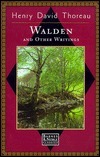
Walden and Other Writings
Book Description
Amid the chaos of industrial America, one man's quiet rebellion unfolds. "Walden and Other Writings" captures the essence of solitude, nature, and self-discovery as Thoreau crafts a vivid narrative of his two years living in the woods, where he confronts the brutality of modern life and the beauty of simplicity. Each page resonates with a call to awaken the spirit, inviting readers on a profound journey of reflection and enlightenment. As Thoreau questions society's relentless march forward, what truths will emerge from the stillness of the woods?
Quick Book Summary
"Walden and Other Writings" stands as a foundational work of American literature and philosophy, documenting Henry David Thoreau’s experiment in simple living at Walden Pond. Seeking an authentic existence, Thoreau withdrew from society for over two years, chronicling his observations of nature, reflections on personal freedom, and critiques of modern civilization. Through his essays, he explores themes of self-reliance, the sanctity of the natural world, and the necessity of questioning conformity and materialism. Thoreau’s writings challenge readers to reconsider their relationship with nature, society, and themselves, ultimately serving as a meditation on how to lead a deliberate, meaningful life. The collection’s enduring relevance and poetic style make it a touchstone for those seeking inspiration to live with purpose and integrity.
Summary of Key Ideas
Table of Contents
Living Simply and Deliberately
Thoreau begins his account by explaining his choice to retreat from the bustling society of Concord to the quiet shores of Walden Pond. He seeks to discover whether it is possible to live simply and confront only the essential facts of life. Thoreau builds his own cabin, grows his own food, and lives with minimal financial means, detailing both the practical aspects of his experiment and its deeper philosophical motivations. He challenges the notion that progress and material success yield happiness, advocating instead for a life of purpose and simplicity, where one’s needs are consciously examined and met without excess.
Nature as a Guide and Teacher
A central theme in Thoreau’s work is the vital role of nature in nurturing the human spirit. He describes the changing seasons, the rhythms of wildlife, and the subtle beauties of his surroundings in lyrical detail. Nature provides him with constant inspiration and serves as a mirror for personal growth and enlightenment. Thoreau believes that by immersing oneself in the natural world and observing its patterns, individuals can gain insight into universal truths and learn to harmonize their lives with the order of nature.
Critique of Materialism and Society
Thoreau offers a sharp critique of the materialism and blind conformity he observes in society. He questions why people labor endlessly for possessions they do not truly need and warns against allowing commerce, technology, or custom to dictate one’s values and priorities. Thoreau’s call is clear: resist the temptation to measure success by wealth or societal approval. Instead, seek richness in experiences, knowledge, and self-reliance. His insistence on questioning the status quo and living according to one’s inner convictions challenges readers to rethink their habitual ways of living.
Individualism and Civil Disobedience
Throughout the collection, Thoreau explores the importance of self-examination, independence, and the courage to dissent from unjust norms. His essay "Civil Disobedience" articulates the duty to challenge laws and institutions that conflict with one’s conscience. Thoreau’s own acts of resistance stem from his belief that true freedom and moral integrity require action, not passive acceptance. He inspires readers to serve higher principles and to trust their own judgment, even when it puts them at odds with mainstream society.
Self-Discovery through Solitude
Ultimately, Thoreau presents solitude not as loneliness, but as a powerful avenue for self-discovery and renewal. His time alone at Walden Pond allows him to reflect deeply, shed distractions, and grow in self-understanding. Thoreau’s writings suggest that solitude and close communion with nature are necessary conditions for cultivating wisdom, inner peace, and a purposeful existence. "Walden and Other Writings" endures as a call to mindfulness, authenticity, and a deeper connection with the world and oneself.
Download This Summary
Get a free PDF of this summary instantly — no email required.





